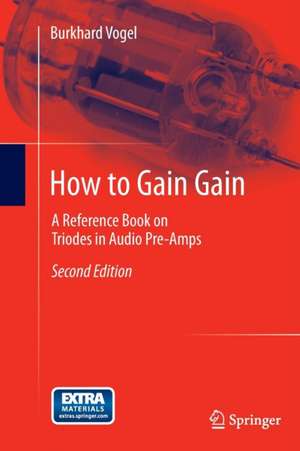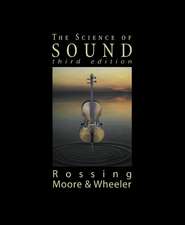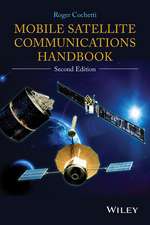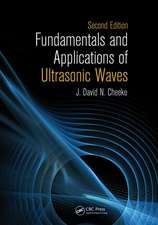How to Gain Gain: A Reference Book on Triodes in Audio Pre-Amps
Autor Burkhard Vogelen Limba Engleză Paperback – 29 oct 2016
All what is needed are the data sheet valve characteristic figures of the triode's mutual conductance, the gain factor and the internal plate (anode) resistance. To calculate frequency and phase responses of gain stages the different data sheet based input and output capacitances have to be taken into account too.
To calculate transfer functions and signal-to-noise ratios for any kind of triode driven gain stage, including all its bias setting, frequency, phase, and electronic noise influencing components, example Mathcad 11 worksheets as an essential simulation tool for each chapter allow easy follow-up and application of the respective formulae. Free download of all worksheets is guaranteed from the editor's web-site.
| Toate formatele și edițiile | Preț | Express |
|---|---|---|
| Paperback (2) | 499.53 lei 6-8 săpt. | |
| Springer Berlin, Heidelberg – 29 oct 2016 | 499.53 lei 6-8 săpt. | |
| Springer Berlin, Heidelberg – 15 oct 2010 | 636.27 lei 6-8 săpt. | |
| Hardback (1) | 669.99 lei 6-8 săpt. | |
| Springer Berlin, Heidelberg – 5 dec 2013 | 669.99 lei 6-8 săpt. |
Preț: 499.53 lei
Preț vechi: 587.67 lei
-15% Nou
Puncte Express: 749
Preț estimativ în valută:
95.60€ • 99.44$ • 78.92£
95.60€ • 99.44$ • 78.92£
Carte tipărită la comandă
Livrare economică 15-29 aprilie
Preluare comenzi: 021 569.72.76
Specificații
ISBN-13: 9783662501863
ISBN-10: 3662501864
Pagini: 876
Ilustrații: XIV, 862 p. 536 illus.
Dimensiuni: 155 x 235 x 44 mm
Greutate: 1.21 kg
Ediția:Softcover reprint of the original 2nd ed. 2013
Editura: Springer Berlin, Heidelberg
Colecția Springer
Locul publicării:Berlin, Heidelberg, Germany
ISBN-10: 3662501864
Pagini: 876
Ilustrații: XIV, 862 p. 536 illus.
Dimensiuni: 155 x 235 x 44 mm
Greutate: 1.21 kg
Ediția:Softcover reprint of the original 2nd ed. 2013
Editura: Springer Berlin, Heidelberg
Colecția Springer
Locul publicării:Berlin, Heidelberg, Germany
Cuprins
From the Contents: Basics - Noise in Triodes - Noise in Components and Other General Noise Effects - The Common Cathode Gain Stage (CCS) - CCS Mathcad Worksheets - The Common Anode gain Stage (Cathode Follower CF) - CF Mathcad Worksheets - The Common Grid gain Stage (CGS) - CGS Mathcad Worksheets - The Concertina (Cathodyne) Phase Splitter (CPS) - CPS Mathcad Worksheets - Constant Current Generators (CCG) - CCG Mathcad Worksheets - The Cascode Amplifier (CAS) - CAS Mathcad Worksheets - The Shunt Regulated Push-Pull Gain Stage (SRPP) - SRPP Mathcad Worksheets - The µ-Follower (µF) - µF Mathcad Worksheets - The CCS with Active Anode Load (CCA) - CCA Mathcad Worksheets - The Cascoded Cathode Follower (CCF) - CCF Mathcad Worksheets - The White Cathode Follower (WCF) - WCF Mathcad Worksheets - Triodes In Parallel Operation (PAR) - PAR Mathcad Worksheets - The CCS Followed by a CF (CCSCF) - CCSCF Mathcad Worksheets - Differential Gain Stage (DIF) - DIF Mathcad Worksheets - Feedback (FB) - FB Mathcad Worksheets - Data Sheets and Summaries of Example Gain Stage Calculations (MSC) - Appendices - Index
Textul de pe ultima copertă
The 34 chapters of the 2nd edition of How to Gain Gain give a detailed insight into a collection (54) of the most common gain producing, constant current generating possibilities, and electronic noise creation of triodes for audio pre-amplifier purposes. These chapters also offer complete sets of formulae to calculate gain, frequency and phase responses, and signal-to-noise ratios of certain building blocks built-up with this type of vacuum valve (tube). In all cases detailed derivations of the gain formulae are also presented.
All what is needed are the data sheet valve characteristic figures of the triode's mutual conductance, the gain factor and the internal plate (anode) resistance. To calculate frequency and phase responses of gain stages the different data sheet based input and output capacitances have to be taken into account too.
To calculate transfer functions and signal-to-noise ratios for any kind of triode driven gain stage, including all its bias setting, frequency, phase, and electronic noise influencing components, example Mathcad 11 worksheets as an essential simulation tool for each chapter allow easy follow-up and application of the respective formulae. Free download of all worksheets is guaranteed from the editor's web-site.
All what is needed are the data sheet valve characteristic figures of the triode's mutual conductance, the gain factor and the internal plate (anode) resistance. To calculate frequency and phase responses of gain stages the different data sheet based input and output capacitances have to be taken into account too.
To calculate transfer functions and signal-to-noise ratios for any kind of triode driven gain stage, including all its bias setting, frequency, phase, and electronic noise influencing components, example Mathcad 11 worksheets as an essential simulation tool for each chapter allow easy follow-up and application of the respective formulae. Free download of all worksheets is guaranteed from the editor's web-site.
Caracteristici
Summary of all the gain producing possibilities of triodes in one place Shows how to calculate first and spend money for expensive components later Gain making elements far away from silicon: Vacuum valves and audio transformers
















